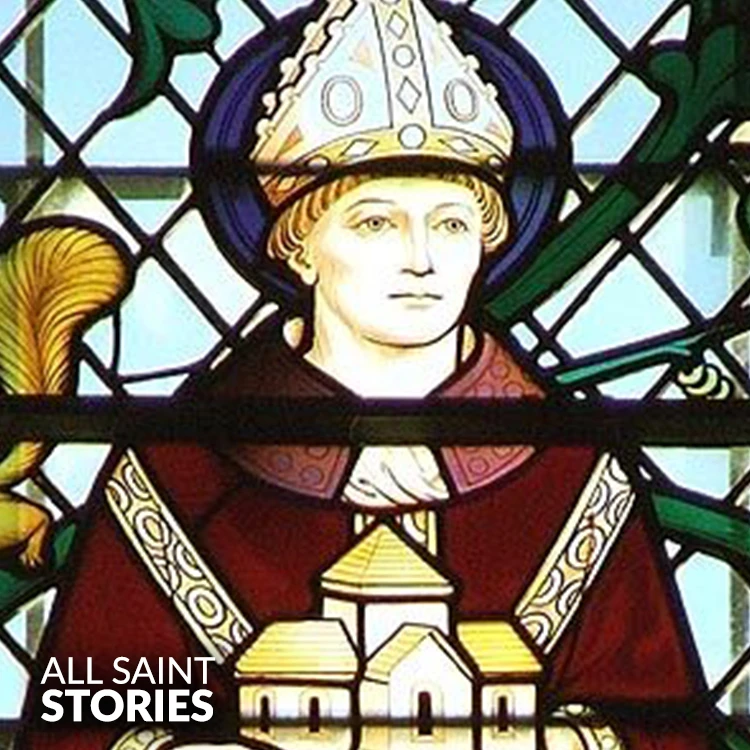"O glorious St. Oswald, you were a model of true faith and meekness. Splendor of Worcester and Luminary of York, like a tree in the midst of paradise did you bear the fruit of virtues for the Lord, and therewith you enlightened all who cherish your honored memory and ever cry out to you in prayer: Intercede, O holy bishop, that our souls may be saved. Amen."
ST. OSWALD WORCESTER
ST. OSWALD WORCESTER

St. Oswald of Worcester was an Anglo-Saxon bishop and monastic reformer of the 10th century. As Bishop of Worcester and later Archbishop of York, he revitalized monastic life in England. He was known for his piety, learning, and care for the poor. He died in 992 while washing the feet of the needy.
St. Oswald of Worcester was born around 925 in England, possibly of Danish descent. He was raised in a pious family and received an excellent education. His uncle, Archbishop Oda of Canterbury, influenced him to pursue a religious life. Oswald traveled to Fleury Abbey in France, where he studied monasticism and became deeply inspired by the Benedictine way of life.
Returning to England, Oswald was appointed Bishop of Worcester in 961. He dedicated himself to restoring monastic discipline and reintroducing the Benedictine Rule to England. He founded several monasteries, including Ramsey Abbey, which became a center of learning and spirituality. His reforms, alongside those of St. Dunstan and St. Æthelwold, helped revive English monasticism.
In 972, Oswald was elevated to Archbishop of York, yet he continued to serve as Bishop of Worcester, preferring Worcester’s monastic setting. He was deeply loved for his kindness, humility, and care for the poor. Every day during Lent, he personally washed the feet of the needy and provided them with food.
On February 29, 992, while performing this act of charity, Oswald passed away. He was immediately venerated as a saint for his piety and dedication to reform. His tomb in Worcester became a place of pilgrimage, and he was canonized in the medieval period.
Video Not Found
The information on this website is compiled from various trusted sources. While we aim for accuracy, some details may be incomplete or contain discrepancies.
If you notice any errors or have additional information about this saint, please use the form on the left to share your suggestions. Your input helps us improve and maintain reliable content for everyone.
All submissions are reviewed carefully, and your personal details will remain confidential. Thank you for contributing to the accuracy and value of this resource.
Credits & Acknowledgments
- Anudina Visudhar (Malayalam) – Life of Saints for Everyday
by Msgr. Thomas Moothedan, M.A., D.D. - Saint Companions for Each Day
by A. J. M. Mausolfe & J. K. Mausolfe - US Catholic (Faith in Real Life) – Informational articles
- Wikipedia – General reference content and images
- Anastpaul.com – Saint images and reflections
- Pravachaka Sabdam (Malayalam) – Saint-related content and insights
We sincerely thank these authors and platforms for their valuable contributions. If we have unintentionally missed any attribution, please notify us, and we will make the correction promptly.
If you have any suggestion about ST. OSWALD WORCESTER
Your suggestion will help improve the information about this saint. Your details will not be disclosed anywhere.
© 2026 Copyright @ www.allsaintstories.com





 English
English
 Italian
Italian
 French
French
 Spanish
Spanish
 Malayalam
Malayalam
 Russian
Russian
 Korean
Korean
 Sinhala
Sinhala
 Japanese
Japanese
 Arabic
Arabic
 Portuguese
Portuguese
 Bantu
Bantu
 Greek
Greek
 German
German
 Dutch
Dutch
 Filipino
Filipino